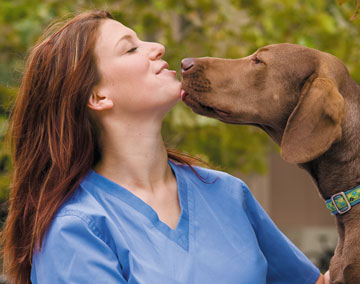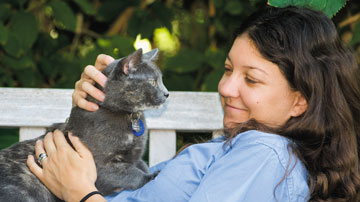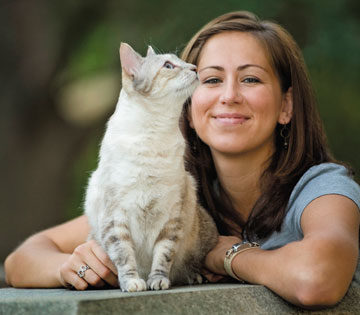Volume 27 · Number 1 · Fall 2009
Vets' Pets
Many people find it tough to separate their work from their personal lives, and students typically take their studies wherever they go. But few bring home special projects the way some UC Davis veterinary students do. These students foster and adopt animals that otherwise stand little chance of survival. After spending hours at school studying animal health, many vet students go home to care for a menagerie of ailing cats and dogs. Here are a few stories of vet students and their now healthy, happy pets.
Rachel Kaplan D.V.M. ’10
(Don Preisler/UC Davis)
As a kid, Rachel Kaplan owned more My Little Ponies than Barbie dolls. “I don’t remember a specific time when I made the decision to be a vet,” she said. “I just know that I didn’t want to be anything else.”
As a vet student, Kaplan’s first rescue was a poodle and terrier mix named Cosita from a shelter in Colusa County. She fostered Cosita for a few weeks, vaccinated her, took her to the veterinary office and found her a home. “She’s now in great health. It’s a very rewarding experience!”
She didn’t keep a dog of her own, however, until she stumbled across Millie, a 4-year-old weimaraner and lab mix. At the beginning of the 2007–08 school year, Kaplan signed up to be a dog walker for the veterinary school. “I was living in an apartment where I couldn’t own a big dog, but I wanted some pooch time so I decided this would be a good job.”
Kaplan was randomly assigned to Millie, who was rescued by the vet school from the shelter. Her job was to train and socialize Millie, so she would be ready for adoption at the end of the school year.
“In probably less than two weeks, I decided I would adopt Millie,” she said, and by June 2008, Millie was officially hers. “The best part has been the complete, selfless love that Millie gives me — her wagging tail always puts a smile on my face at the end of a long day.”
Kaplan, who is UC Davis’ national representative to the Student American Veterinary Medical Association, said veterinary students don’t rescue animals because they have to — they do it because they want to.
“When we rescue animals, it comes from a very genuine place and a true desire to save lives and offer unconditional love,” she said. “We can give a voice to shelter animals and be advocates for giving loving animals a second chance, and I take pride in that role.”
Anna Smith ’01, M.A. ’06, D.V.M. ’10

(Cheng Saechao/UC Davis)
Anna Smith has always loved cats. Her first word was “kitty,” and the only time in her life she was without one was when she stayed in the dorms at UC Davis as a freshman.
“I have a strong compassion for cats,” said Smith, current president of the campus’s Feline Medicine Club and a volunteer at a Sacramento animal shelter. “They often do gross things, but I love them unconditionally.”
Today, Smith owns four felines. She rescued two of them, Cameron and Nightingale, ages 11 and 10, from the UC Davis Feline Retroviral Research Laboratory, where she worked eight years ago. Since volunteering at the shelter, she’s acquired Steve, a 3-year-old female stray, and Piggy, a 5-year-old that was given up by her previous owners when they moved out of the area. Both were severely sick — Smith adopted them the day before they were to be euthanized.
“A lot of cats are put down because the shelters don’t have the resources to spend on them,” she said. Smith nursed Steve and Piggy back to health, and now they sit next to her while she studies for classes. “It makes me feel really good every time I look at my cats and think about how I was able to give them their lives,” she said. “They’re such wonderful, magnificent animals — they deserve a chance.”
The adjustment to living with four cats has been harder on her husband, Justin. He had never owned a cat before he moved in with Smith, and now he has to fight for extra space on the bed. “He used to be deathly allergic to cats, but now he’s fine,” she said, “which is good because I don’t think it would have worked out if he was.”
Liz Curto D.V.M. ’10
Liz Curto can’t live without pets. “I’ve had animals my whole life,” she said. Within six months of moving to Davis, she adopted two cats, Alex and Skia, from the Orphan Kitten Project. She originally opted for cats because she didn’t believe she was ready to own a dog. Then she met Roma.
Curto received an e-mail about the dog from the veterinary school in May 2008. Her fellow students were working on a Hoopa tribe reservation in Humboldt County with Rural Area Veterinary Services, which helps people and their pets get the veterinary services they can’t afford. When they met Roma, she had recently given birth and was inflicted with fleas, ticks and heartworms — conditions that required further treatment in Davis.
Roma needed multiple injections over several months to treat her heartworms. “The heartworm procedure is really painful, and the dog had no idea what was going on,” Curto said. But the end result was a “very happy and healthy” animal. “Roma is the sweetest dog you’ll ever meet; she sleeps a lot, runs — will take a hug any day.”
According to Curto, the best part “is when they’re all better, and they look at you, and it seems like they’re grateful for you being in their life…. It’s really nice to have someone who’s happy when you come home. They always brighten up your day — no matter how bad it was.”
Erin Updegrove ’05, D.V.M. ’10
Erin Updegrove has traveled to various Latin American countries like Argentina, Brazil, Peru and El Salvador to help improve the conditions of animals’ lives. Three summers ago in Mexico, she met one of the most “pitiful looking” dogs she had ever seen.
Updegrove was working at a free spay and neuter clinic when a group of kids brought in an 8-pound, 5-month-old pit-bull/boxer mix. According to Updegrove, the dog had nothing good going for him — he had worms, mange, ulcers on his tongue and was malnourished. “He was cat-size,” she said, “I know plenty of cats who are bigger than that.”
At first, she didn’t want to keep him. “He was so weak, he didn’t have a personality,” she said, but as they started to feed him and nurse him back to health, he revealed his true self: “He is a big kisser.”
Unable to leave Mexico without him, she drove the dog to the border where her friends picked him up and brought him back to Davis to continue treatments.
His name, Enano, means dwarf. However, under Updegrove’s care Enano has gained more than 50 pounds and is the picture of health. “Now I get compliments on how beautiful he is,” Updegrove said. She still keeps pictures on her cell phone of what Enano looked like when she first saw him. “There are so many who don’t get a chance,” she said. “I’m happy I got to save one.”
Valerie Shearer D.V.M. ’10

(Cheng Saechao/UC Davis)
When Valerie Shearer first saw Moose at a shelter almost two years ago, he had a broken femur and almost no chance of being adopted. With the intention of fostering the cat, Shearer took him to the hospital and then monitored his health at her home until he was completely healed and well. However, he never left.
Besides Moose, Shearer has rescued a 1-year-old dog named Diego and a 5-year-old cat named Madison from the Sacramento animal shelter where she volunteers. “Personally, I could never purchase an animal,” she said. “I’ve been to a lot of shelters, and they’re always full. I’ve seen how sweet the animals are.”
But now Valerie and her animals are separated by more than 700 miles. In the summer of 2008, Shearer interned in Seattle while her boyfriend, Sean Munday, worked in the city for Microsoft. Before she returned to UC Davis to continue veterinary school, she decided to let him keep Moose, now a 2-year-old with a compulsion to chew on iPods and “take things, particularly things you need, and shove them under the stove,” according to Shearer.
“I miss his hilarious off-kilter personality, and the times he would clumsily fall off the edge of the futon when he tried to roll over for a belly rub,” Shearer said. To keep Moose company, she also left Diego with Munday, but kept Madison.
Though Shearer misses Moose and Diego, home life is still chaotic with two other veterinary students, two more cats and two dogs as housemates. She said veterinary students get a sense of satisfaction when they nurse pets back to health and peace of mind when they know they’ve improved an animal’s life. “We have the knowledge base… we have more resources,” she said. “We keep them alive. “
